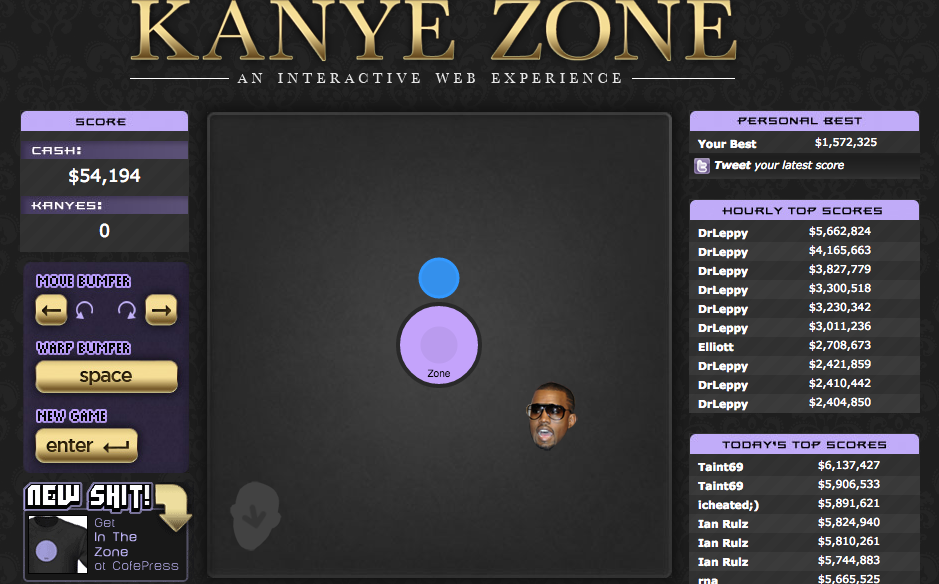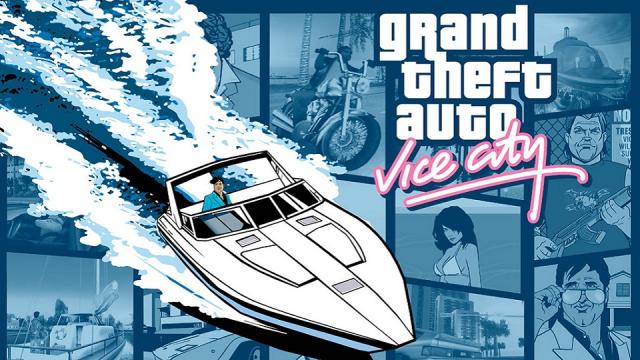One of my most enduring game memories is getting into a car in Grand Theft Auto: Vice City and tearing down the road to Two Tribes on Wave 103. Pop is the perfect gaming accompaniment – why can’t we have more of it?
Wave 103 is the greatest. It helps make Vice City into a city that has more life in it – screaming down the road in a supercar was never more pleasurable, and the music gave you a definite sense of time and place. It was functional world building – you want the neon eighties? OK, we’ve made the perfect soundtrack straight from the eighties.
By the time I was let into the Rockstar North office to work there on GTA IV in 2007, I was gushing all over the place about how much I liked the Vice soundtrack, and even though working somewhere changes your experience of a game, I still love almost everything about the GTA IV soundtrack too. The Rapture’s No Sex For Ben is still one of my favourite tracks because every time I walk down a rainy, moody New York footpath it reminds me of Rockstar’s Liberty City. And it’s weird now I’ve left, but GTA V‘s pop radio station is exactly my music taste and is run by a DJ called Cara, so sometimes I wish I still worked there.
Rock and roll is dead and pop is iiiiiiin!
But Saint’s Row 4 uses pop music to the max too: my favourite moment in the entire franchise is when you’re flying your spaceship along for the first time and your character flips the switch on the radio. Haddaway’s What Is Love comes on. This is my jam! you squeal, lasering things along to the beat.
The best pop music is designed, in many ways, like some of the best games. Good pop is very finely paced, with moments of high attention and low attention, it is written to emphasise euphoria and movement, and composers of pop music pay close attention to how they can hook people with ‘set pieces’ (choruses). It’s easy to see, for example, why the developers of Farcry 3 chose M.I.A.’s Paper Planes to open the game, because the song is about travel, guns, and murder, and it is also exquisitely timed to be exciting, punchy, raw.
It was quite disappointing, then, to play Farcry 3 and see that the narrative there wasn’t quite as strong a critique of colonialism as M.I.A.’s work often is, even though it tried to be just as provocative. You have to be careful to choose your tracks wisely to emphasise your best parts. For GTA that’s driving. For Saint’s Row, that’s jokes.
Of course, games like Guitar Hero, Elite Beat Agents, and Rock Band use pop music or karaoke as the obvious draw, and take their tips from the music to construct buttons for the player to hit, rhythms to tap, and what is referred to as ‘level design’ is actually centred around presenting a track of music as visual instruction to press along to or sing along to.
One of my favourite games to take a piece of music as game design instruction is the free browser game Kanyezone. It takes the Kanye track N***** In Paris and converts the abstract lyrics of the rap song into design. The lyric from the outro ‘Don’t let me get in my zone, don’t let me get in my zone’ is converted into a screen where Kanye’s face is wandering around randomly, and in the centre is the ‘zone’. Your job is to control a small circle around the zone with the arrow keys to butt Kanye away from getting into his zone, or Jay-Z will turn up and yell at you that Kanye is definitely in his zone.

It’s actually quite an easy game to get to grips with but hard to be good at. Of course, you earn points in the form of fake dollars and get on the scoreboard.
Probably the best part of audio design in the game is the part where when you restart the game and Jay-Z yells ‘SHUBOI’.
It’s a really interesting look at deconstructing a pop track’s lyrics into something that’s playable, and also using samples from the track itself to have you keep paying attention, get up some rhythm, and to groove along too.
It’s obviously very expensive to licence pop tracks for use in commercial games, so indie games have so far only dabbled in pop music. My friends over at The Fullbright Company negotiated a private deal to use Riot Grrrl music in the game Gone Home, and the amazing game Crystal Warrior Ke$ha made by my former colleague at Rock Paper Shotgun, Porpentine, asks the user to play a Youtube track by Ke$ha before you navigate its Ke$ha mythology and quotations, thus avoiding any copyright issues.
The soundtrack provided by M.O.O.N. and Peturbator for the top-down fuck-em-up Hotline Miami creates the mood and compulsory risk-taking you experience playing the game. Though the developers knew the soundtrack would be essential to the feel of playing the game, it was hard to get the kind of tracks they wanted, so Jonatan Soderstrom said they went to negotiate with artists on Band Camp, says Rock Paper Shotgun:
“We had a temp soundtrack in place for the game,” says one half of the game’s dev team, Jonatan Soderstrom. “But when we couldn’t get the licenses for the tracks I went out on to Band Camp and found a bunch of cool music you could download for free. That’s how I found M.O.O.N.”
The soundtrack in Hotline Miami creates a strange, feverish feeling in you as a player, and when you die in the game, as is often the case, the tap of the ‘R’ to respawn and try again becomes part of the rhythm of the soundtrack. As I said as a newb game critic back in the mists of time:
It is the vibrating eighties beat of Drive, the soundtrack that the original GTA wanted but couldn’t have. It is a pumping powerhouse of neon rave, addictive and sordid. …When you die, which will be more often than you blink, you start right over immediately, not a drop in the beat. Keep going all night, it says. Keep going until dawn birds knock you into realisation that you have wasted your life on this beautiful and savage game. Each environment is a new triumph of brutal one hits, and the plot increasingly persuades you that you are hallucinating, that you are a deluded idiot for playing on, and yet you cannot tear yourself away.
Obviously expense is the limit with pop tracks, but in the future my hope is that more music labels will actually reach out to gamemakers, or make it easier for them to licence their tracks. There’s a great relationship to be had between music labels and games, and it doesn’t just stop with the big budget studios or the rhythm game developers. Pop and games can be beautiful together.

Comments
32 responses to “I Love Games That Use Licensed Pop Music”
The original GTA soundtrack is still one of my favourite video game soundtracks. Old PSone CDs could be put in a CD player and would play the soundtrack. GTA went in the car stereo on many road trips and was slipped into many house party CD players in the late 90s.
Sit back, relax, and let the funk be your saviour.
My favourite song on the original GTA was the theme song. Which was called Grand Theft Auto I believe.
Do you remember that song from GTA 2 Taxi drivers must die?
Loved that track!
68 to dead fly, 89FM Head Radio. I used to throw it in my car’s CD player for commutes home from work. Funk FM in particular was good to unwind to. Reckon I’ve had this track on every phone/music player I’ve had since about 2005 too:
Vice City definately has the best soundtrack of all the GTA’s. I also have to agree that Saints Row 4 had me squeal with glee over a song but it was when Stan Bush started. 50+ hours of that on loop and I still wasnt sick of it!!
YOU GOT THE TOUCH! YOU GOT THE POWAAAAAAAAAAAAAAA!!!!!!!!!!!!!!! YEAH!!!!!!!!!!!!!!!!
Vice City had the best soundtrack. Thinking of buying a copy of it.
If you have the original PS2 game disc you can rip the music from the data files with a program like psound:
http://snailrush.online.fr/PSound/
(that way you also get the DJ chat)
I downloaded it, and have Vrock blasting in the car regularly.
V-rock with a dash of Emotion has been part of my cars music player lineup since I started driving. No regrets!
For sure. About the only GTA game where I haven’t favoured the chat stations even though they were also awesome. But V-Rock was always my fave with Vice City.
Brutal Legend
/Discussion
Awesome soundtrack, unfortunately awkward game design.
My favourite soundtrack will always be Tony Hawks Pro Skater.
As a fledgling punk rocker it was godsend!
I think your mistaken……Its VROCK and that song when your in the supercar crossing the bridge into Starfish Island was The Cult’s She Sells Sanctuary.
Followed by the Ad for Evacuator pt2 –
“They’ve got your Wife Tim!”
“But Im not married”
“You are now…..to America!”
The sountrack for Burnout 3 felt pretty fitting for it.
It really did. I don’t think any of the songs were that good in isolation, but together they were awesome.
The feeling when I fired up GTA Vice City Stories, jumped on the first motorbike and cruised down the main strip to the sounds of Talk Talk’s – It’s My Life: sublime. Pity the game’s controls were so frustrating. That forklift mission…
Command and Conquer. Number 1 soundtrack everrrr
We are going to have to ask, if we want to live in a different world… +1
Always loved the licensed music in Prey. Some great bands featured in that game. Never would have come across the band After Midnight Project if it wasn’t for that game.
Oooooooooooooooohhhh Baracuda! *raises the roof*
Man I should play Prey again. Shame about the sequel being canned.
Yes, hearing Heart kick out that song on the Jukebox was awesome.
Was looking forward to the sequel, so was bummed to hear it got canned.
Pretty sure Wave103 was the new wave station. Flash FM was the pop one. Both good though
What about sledstorm? That had a pretty awesome soundtrack for a PS1 game.
Best memory in Saints Row 2 jumping in the helicopter gunship as 3 inches of blood – Deadly sinners starts and then leads into Avenged Sevenfold – Bat Country.
Then in Watchdogs when you defend the junkyard and Ministry – Jesus built my hotrod starts cranking.
Sleeping Dogs – Yellow Fever is so addictive =>
GTA Vice City is my third favourite soundtrack, behind Need for Speed Most Wanted (the old one), and GTA V.
Vice City indeed had an epic soundtrack however in all the GTAs I’ve always loved the talkback and public radio stations. Such great satire.
You posted about music and Saints Row and didn’t use this from 3? For shame.
I can’t believe I didn’t mention Far Cry 3 and Die Antwoord and Skrillex they were awesome uses of music during missions.